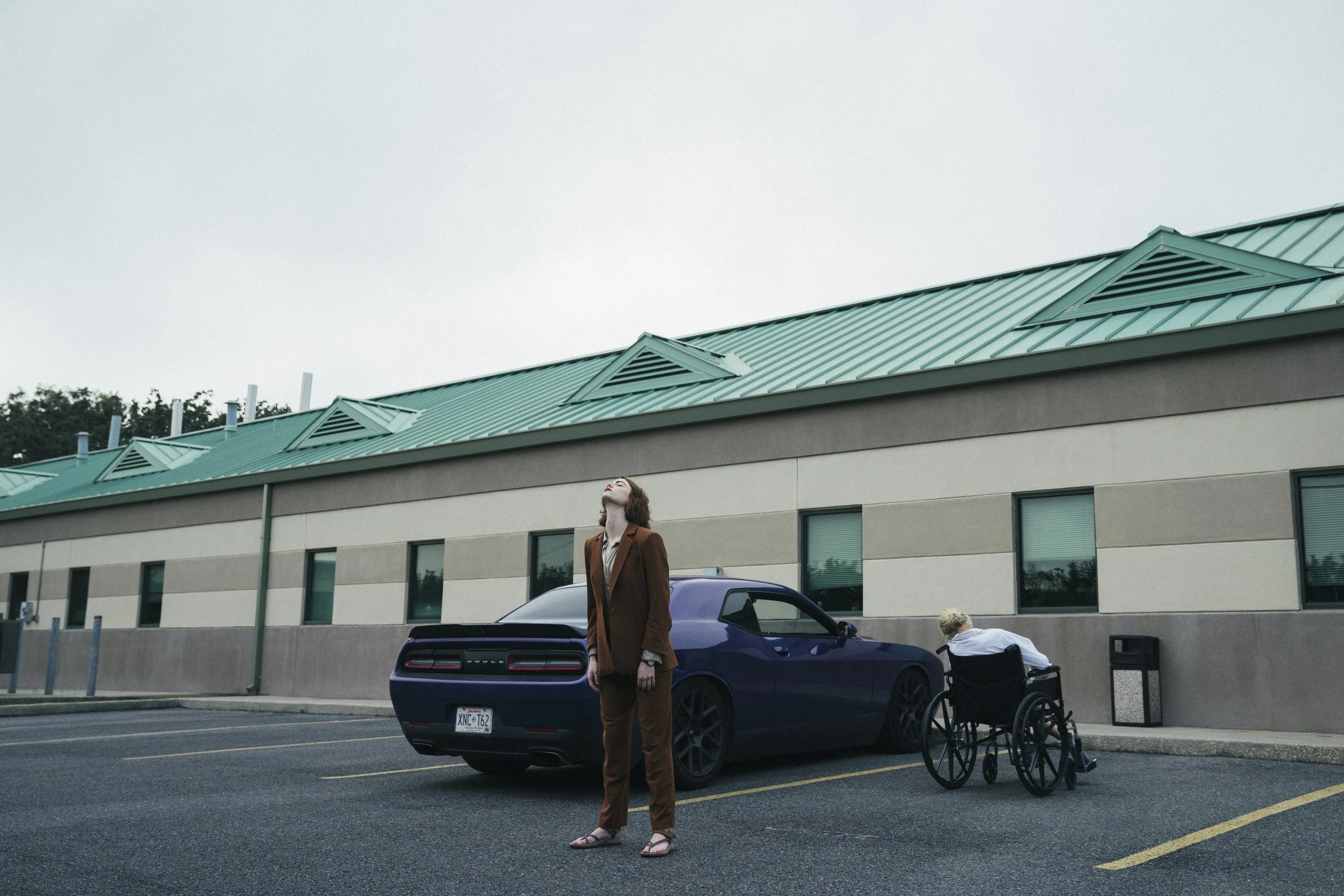‘Kinds Of Kindness’ Review: Sweet Dreams
Emma Stone in Kinds of Kindness. Courtesy of Searchlight Pictures. © 2024 Searchlight Pictures All Rights Reserved
Kinds of Kindness, the latest from Yorgos Lanthimos — who you’ll know from last year’s Poor Things — is unlike anything he’s made. Anything he’s made under a major studio, that is.
A trio of short stories that feels like a return to his very dry, very dark roots, Lanthimos’ “triptych fable” feels like anything but the kind of tale you’d associate with the magical quality of a fable. That’s not to say there isn’t magic in Kindness — the film is a movie that doesn’t stray away from anything, grounding its stories’ stakes in that of a businessman tired of being managed, a man whose wife feels foreign to him, and two cultists in search of a woman who can revive the dead.
On paper, there’s no clear throughline between any of these tales, but each story has the same key players and ties the themes of love, sexual dependency, and acceptance together to make what feels like almost a cohesive narrative. Plus who doesn't want to see Jesse Plemons go through three haircuts in three hours?
Kinds of Kindness is densely layered. There are endless interpretations of the way to pick apart the characters in themes of each of its stories. More connected than purely anthological — that’ll happen when you use the same cast for each short story — it seems the easiest way to crack the hard, dry surface of these seemingly parallel narratives is through Eurythmics’ “Sweet Dreams,” which echoes over the opening titles before seamlessly becoming diegetic sound, blasted through the speakers of a blue BMW, driven by the titular R.M.F. in the film’s first story, The Death of R.M.F.
Jesse Plemons in Kinds of Kindness. Courtesy of Searchlight Pictures. © 2024 Searchlight Pictures All Rights Reserved
While Kinds of Kindness is guided by its ensemble, many of whom are returning players in the court of Lanthimos, the film evolves into much more of a two-hander, though Plemons emerges as the overall lead, especially in the first two-thirds of the film.
In The Death of R.M.F., Plemons is Robert, a mild-mannered businessman in New Orleans, giving in to his boss’ (Willem Dafoe) every request, until he’s had enough. In terms of the chorus of “Sweet Dreams,” Death is the “Some of them want to… use you / abuse you” of the film. In R.M.F. Is Flying, Plemons is a policeman whose wife (Emma Stone) returns after being missing at sea. When she returns, small things lead him to believe that the woman he sees before him is not his wife — the “some of them want to be abused” chapter. In the final part of this triptych, R.M.F. Eats a Sandwich, Plemons shares the spotlight with Stone, both cultists searching through the bayou in search of their prophesized spiritual leader who can bring life to the dead — finally, the “some of them want to get used by you” of the chorus of tales.
Kinds of Kindness feels more like a step back in time for Lanthimos, reverting to his older, crueler forms, vastly different than the… kinder tone of his last two American films (The Favourite and Poor Things). It’s all an opportunity for the ensemble to get to play with the material. The temporal retreat is more appropriate, given the fact that Lanthimos co-writes here again with Efthymis Filippou, who he teamed up with for his earlier films, including Dogtooth and The Killing of the Sacred Deer, the two closest comparisons to Kindness in Lanthimos’ filmography.
(L-R) Margaret Qualley, Jesse Plemons, and Willem Dafoe in Kinds of Kindness. Courtesy of Searchlight Pictures. © 2024 Searchlight Pictures All Rights Reserved
Though the world built within these three stories is cold, with stilted dialogue and eccentric characters, something about it is inviting. It could be Oscar winner Johnnie Burn’s sound design, aiding to create a tangible world — different than his work on last year’s The Zone of Interest, while immersive all the same. Another possibility as to why Lanthimos’ anthology feels much more interlaced than say, Wes Anderson’s The French Dispatch (still a fantastic film in its own right), is the heart — figurative and literal — it places within each of its characters.
The titles of each segment of the film — death, flight, and, well, sandwiches — are almost entirely unhelpful in deciphering the film, or at least much less so than the film’s overall title — for each chapter displays its own different kind of kindness.
For as psychologically cruel as Death may be on its psychosexually dependent characters, it’s nothing compared to what is to follow in Flight and Sandwich. Robert (Plemons), the businessman, has seemingly become nothing without Raymond (Dafoe). Completely unable to take any agency in his own life. Managed from the grand, life-defining, to small, everyday things. Robert thinks he wants freedom in his own life, but the violence-filled journey of self-discovery that this thought leads him on may prove, if nothing else, that freedom from, not of choice can be bliss in its own right. There’s a noteworthy gag on hyper-specific sports memorabilia that aids the basic human connection between Robert and Raymond on a purely friendly level that serves as something of a key within the dry wit of the story, reminding us what each of these characters is ultimately after sincere connection.
In R.M.F. Is Flying, the literal (unclear without further explanation at this current time) devil is in the details. The fit of a shoe. What someone will and will not eat. Jesse Plemons’ hair is slightly shorter. Things like that. In this chapter, Plemons is the well-meaning cop, Stone his missing wife Liz. It’s not Stone alone who rises to a prominent part of the story in this Eyes Wide Shut-lite short. Mamoudou Athie and Hong Chau take bigger roles in this middle segment, feeling like natural Lanthimos collaborators, though this is each of their first projects with the Greek auteur.
An aspect of the film — and its collaborators — that shines most brightly in this middle section is Jerskin Fendrix’s score, much barer than his orchestral work on Poor Things, leaning towards a restrained, plucky piano to highlight the despair within each of these characters. Like Poor Things, however, Fendrix cameos again as a musician playing his own diegetic music. Eagle-eyed viewers will spot him in a bar during The Death of R.M.F.
Where Death was a story about trust and freedom, Flight turns itself into something of a tale of love and dedication to oneself and to one’s partner. Both are tales of intuition and how far you’re willing to go for someone you love. The way Lanthimos approaches this in Flight is so loose and crudely comedic that it makes you wonder how much he was holding back in the other two parts of the film. A smash-cut gag about a third of the way through Flight is likely the film’s funniest — an amalgamation of Lanthimos’ independent Greek filmmaking and the tone he’s maintained in his larger, American studio work.
He pushes his actors to hold right on the line of deprivation, as Plemons, in a particular scene, pushes the slightest verbal and non-verbal cues to play the difference between lust and concern — proving ground for his well-deserved Best Actor win at the Cannes Film Festival. Plemons is aided by Stone’s go-for-broke willingness to do anything, as well as balanced out by Mamoudou Athie’s kindness, when he himself comes off as anything but, blinded by a sea of confusion.
Emma Stone and Joe Alwyn in Kinds of Kindness. Courtesy of Searchlight Pictures. © 2024 Searchlight Pictures All Rights Reserved
In the final chapter of Kinds of Kindness, it becomes ultimately clear that this is a movie about how far we — as humans — are willing to go to prove ourselves worthy of love — someone else’s love — and how that controls our perception of the world. For Emily (Stone) and Andrew (Plemons), two cultists in search of a prophesized healer, this means doing anything to find the woman they’re in search of; hold the love of Omi (Dafoe), the short-shorts-wearing cult leader.
Of the three parts of Kinds of Kindness, this is the one where the film’s near-three-hour runtime starts to hit you. Though each story is — technically — one of the film’s three acts, they’re all given their own structure. The first two follow a conventional three-act style with setup, conflict, and short-lived resolution. This final chapter, R.M.F. Eats a Sandwich, employs something more towards that of the structure of 2022’s The Batman — with an implied third-act resolution that’s followed by yet another third act. A fourth act, so to speak. This climactic double-down is only fitting for the least-realistically grounded of the stories of Kinds of Kindness, and where Poor Things starts to spin its wheels in its third act, Kinds of Kindness evolves.
The person-to-person relationships in Kinds of Kindness are so deeply uncomfortably fucked-up that, by the time Emma Stone parks her purple Dodge Challenger in a motel parking lot like she was a NASCAR driver, all expectations have been thrown out of the window. The specific requirements for the woman that Emily and Andrew are searching for feel like something out of a Dungeons & Dragons campaign DM’d by that one friend who plans a 20-hour campaign because they have nothing else going on. This story takes Stone and Plemons’ characters on a journey throughout the Bayou to different potential spiritual guides, including Hunter Schafer (in her only scene) and two Margaret Qualleys — twins. In hopes of discovering the foreseen healer, Stone’s Emily finds herself on more of a journey about herself, her priorities, and letting go. Her character is on a path to decide what love she wants in her life, and exactly what she’s willing to do to hold on to — or let go of — it.
It seems that that’s the thesis of Kinds of Kindness. Love, rather than kindness, and the extent to which we prioritize it in our lives. It’s easy to want to understand each moment of Lanthimos’ three-hour, anamorphically-lensed, color and black-and-white-shot film, but, like any fable, it’s more rewarding to engage with the material, rather than yearn to understand it. Sweet dreams.




